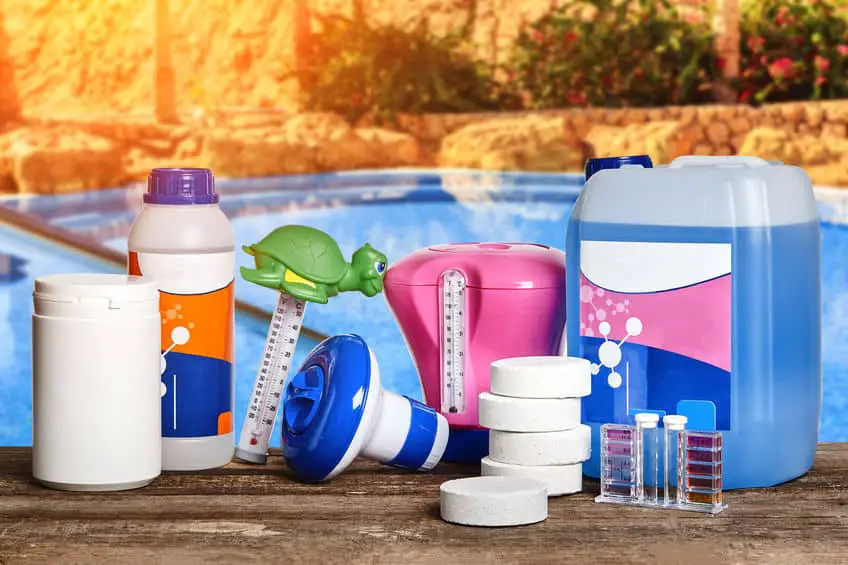See the chemicals shown above in the picture? Many salt water pool owners expect that they will use less chemicals than a regularly chlorinated pool requires and this is generally true. But salt water pools still need chemicals added from time to time as we’ll discuss in this article.
Is a salt water chlorinator worth it or should you just stick with a regularly chlorinated pool?
A salt water chlorinator system is what turns a regular pool into a salt water pool. The up front cost of a salt chlorinator can reduce the work required to maintain water chemistry and usually also offers automation features such as pump timers to reduce your work even more.
If you can stomach the up front costs of a salt water pool system, the automation benefits alone translate to less work on your part, less chemical usage (cost savings) and more enjoyment of the pool.
Does a salt water pool need a chlorinator?
Yes. A pool becomes a salt water pool only when you add a salt chlorinator system that produces chlorine with dissolved salt that you add to the pool water.
A regularly chlorinated pool requires chemical chlorine to be added manually, typically on a weekly basis, to sanitize the water.
A salt water pool uses a chlorination system to convert dissolved salt into chlorine using a process called electrolysis which occurs inside the salt cell. Without the salt chlorinator, you don’t have a salt water pool. It’s as simple as that.
And what would happen if you put salt into a pool that had no salt chlorination system?
Absolutely nothing.
You’d just have a pool with some salt in it.
The costs of a salt water chlorination system add up
The costs to buy a salt water chlorination aren’t cheap, at least to start with. A salt water chlorination system may cost $1,200 – $2,500 to install and each salt cell costs $300 – $400 to replace, give or take. So the up front cost isn’t cheap.
A salt water pool requires:
- Salt water chlorination control system – A good one could last 10 years or longer.
- Salt cell – Typically replaced every 5-7 years but you might find it needs to be replaced a bit sooner if its capacity is used up quicker than expected.
- Water flow sensor – This is built inside the piping and ensures that the chlorinator only runs when there is enough water in the lines.
Some chlorinator models offer add-ons that can further automate tasks and provide more functionality, at a cost of course.
Is it worth it to switch to a salt water pool?
So we just discussed the up front costs of converting to a salt water pool. Are the benefits worth it?
A salt water pool generally involves less maintenance specifically related to water balancing. When it comes to balancing the various aspects of pool chemistry, a good quality salt chlorinator will generally make it easier to do.
A good chlorinator system also has a pump timer which means you can turn your pump on and off automatically. You can probably manage your heater, water feature and even landscape lighting with some models. All sorts of convenience!
Plus, there is some convenience if you happen to be away for a few days in the summer when the pool is open. You can set the timer to keep the pump running and can continue chlorine to be produced so that you come home to a crystal clear pool. A regular chlorine pool will start to go green from algae within a few hot summer days if no chlorine is added.
Finally a good chlorinator system will give you a live salt reading and can even in some cases adjust chlorine for you automatically like the Hayward Sense and Dispense system which manages pH and chlorine levels so you don’t have to.
Saving money in the long run with a salt water pool
You will probably save money on chemicals in general and the cost of salt is pretty cheap. You can buy 1 bag of salt for $10 – $20 depending on what size you get and the quality.
It’s much cheaper than buying chlorine regularly, which other pool owners have to do. Especially when there is a chlorine shortage.
The electricity used by the chlorinator system is negligible too. It’s probably not even worth talking about especially when you consider that the pump timer alone means you will probably save money by running the pump less. Less depreciation on the pump itself too.
So if you value spending less time trying to balance your water chemistry, testing the water, etc then a salt water chlorinator probably makes sense as long as you can stomach the up front costs!
Summary
There is a large up front cost to either switching your existing pool to a salt water system or by building your new pool as a salt water one. Then you will have to replace the salt cell every few years too, also at a cost.
But modern salt chlorinators add levels of automation that can reduce chemical usage and pump time which saves money but also offers you convenience that often translates into less work when compared to a regularly chlorinated pool.
You’ll still have to vacuum your pool regardless! But the cost and time savings can help to balance out the up front cost of the salt chlorination system and can also increase your enjoyment of your pool as a result.

